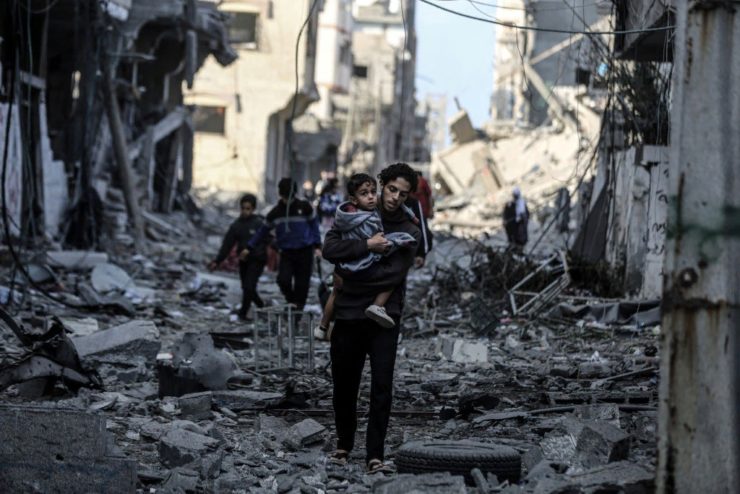
The Hypocrisy of States Advocating for Religion, Human Rights
The situation in Gaza has starkly revealed the insensitivity and hypocrisy of not only the Western world but also the Muslim community. Across the globe, many Muslim countries in the 21st century have experienced chaos and destruction. Yemen, Syria, Iraq, Sudan, Somalia, and others have endured prolonged suffering and devastation. However, the situation in Palestine is uniquely sensitive, with far-reaching consequences for the global order, as emphasized by numerous human rights organizations and activists.
Francesca Albanese, the UN Special Rapporteur on Human Rights in the Palestinian Territory Occupied Since 1967, Israel, has issued a grave warning about the potential for Israeli actions to trigger another ‘Nakba.’ The Nakba, during 1947–49, resulted in the forced expulsion of over 750,000 Palestinians from their homes and ancestral lands, ultimately leading to the establishment of Israel. In 1967, Nakba displaced approximately 350,000 Palestinians as Israel occupied the West Bank and Gaza Strip.
Amid this crisis, the World Health Organization (WHO) is conducting vital supply airlifts to Gaza, which remains cut off from the world. Martin Griffiths, the Under-Secretary-General for Humanitarian Affairs and Emergency Relief Coordinator at the United Nations, has expressed profound concerns about the escalating crisis. “In Gaza, families have been bombed while inching their way south along congested, damaged roads, following an evacuation order that left hundreds of thousands of people scrambling for safety but with nowhere to go,” he said.
Since October 7, 2023, Israeli forces have killed more than 2,000 Palestinians, including over 800 children, while more than 8,000 people have been injured and a staggering 450,000 individuals have been displaced due to Israeli airstrikes. Israeli forces are also targeting groups attempting to leave Gaza to escape the attacks.
Despite the apparent evidence of a genocide against Palestinians, much of the Western world continues to attribute the situation in Gaza to the actions of Hamas. However, this is viewed by analysts as an inadequate justification for targeting innocent civilian lives in the name of defense. It is important to note that not all Palestinian civilians support Hamas, but all of them have endured severe oppression at the hands of Israeli settlers for decades.
It is also essential to address the disinformation surrounding the situation. Claims that Hamas targeted civilians are disputed, and there is currently no concrete proof that Hamas specifically targeted Israeli civilians. In a technologically advanced state like Israel, evidence of such actions would have been captured by numerous surveillance cameras. However, only one video, depicting crossfire at a music festival, is being repeatedly shown by the Zionist media. Conversely, multiple videos have emerged over the years showing Israeli forces targeting civilians, including women and schoolchildren. Some clips even depict Hamas fighters refraining from harming civilians. An important clip shows a Jewish woman talking about how Hamas fighters entered her house during the recent attacks but promised not to harm her or her children.
Nevertheless, if Hamas committed atrocities against civilians, it remains unjustifiable. Some analysts argue that the capture of civilians was intended to draw global attention to the Palestinian situation and disrupt the Saudi-Israel normalization. Unfortunately, the situation spiraled out of control.
In this context, the stance of the United States, a self-proclaimed human rights advocate, is deeply disheartening. The United States is providing both military and financial support to Israel, facilitating a mass ethnic cleansing campaign of the Palestinian population in the name of defense. Many ask: What threat is posed by unarmed women and children to Israeli settlers and the United States? Some reports even suggest that Mossad and the Five Eyes were aware that Hamas was planning an attack. However, the situation was allowed to take place, offering Israel a pretext for another Nakba.
The Palestinian issue transcends religion, culture, nationality, or any other human difference. Many Jews around the world have dissociated themselves from the state of Israel, while many people worldwide, in countries like India, the US, Bangladesh, Japan, Jordan, and Indonesia, have protested against the attacks on Palestinian civilians. However, Pakistan, a self-proclaimed Islamic ideological state and a nuclear power, failed to organize even a single protest against Israeli oppression. While Pakistan claims not to recognize the state of Israel, its foreign office has advocated for a ‘two-state solution.’ Moreover, Pakistan’s so-called ‘religious’ parties and their leaders appear largely disconnected from the Palestinian situation, underscoring the notion that religion serves as a mere tool in the country’s political system. With the former Prime Minister, Imran Khan, incarcerated, there seems to be a lack of individuals in Pakistan with the substance and courage to hold Western countries accountable for their hypocrisy. Even the general public of Pakistan appeared preoccupied with a cricket match against India while the people of Palestine were enduring bombings. Although Pakistanis are active on social media platforms, such as X (formerly Twitter), it often appears as their sole means of expressing their sentiments.
Pakistan’s response is hardly surprising, considering the nation’s handling of distressing situations in Kashmir and Balochistan. Turkey’s current regime, despite its vocal commitment to Islam, has failed to adopt a clear stance on the Palestinian crisis. This highlights a broader trend where both religious states advocating peace and democratic states championing human rights have been exposed as mere hypocrites with their respective agendas.
Taut Bataut – is a researcher and writer that publishes on South Asian geopolitics, exclusively for the online magazine “New Eastern Outlook”.
